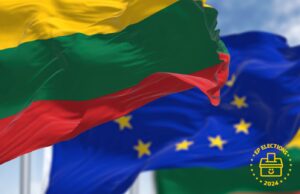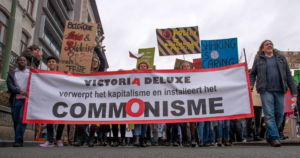Analysis from a partner organisation of transform! on the political landscape in Lithuania that shapes the European Elections.
Who Will Win the European Elections in Lithuania? To answer this rather speculative question we need to consider the constellation of the main political actors in Lithuania.
First of all, it is important to note that, in October 2016, the Lithuanian Peasants and Greens Union (LPGU), led by Ramūnas Karbauskis and Saulius Skvernelis (currently the Prime Minister of Lithuania), won a decisive victory. They received 56 seats in the Parliament (out of 141 seats) and, together with the Lithuanian Social Democratic Party (LSDP), which got 17 mandates, managed to form a majority government in November 2016. What followed later – in the late 2017 – was the split of LSDP. Its new democratically elected leader Gintautas Paluckas (he represents a modern left wing of the party; he is not an MP though) convinced the party that the best thing for it was to leave the governing coalition. The main argument was that LPGU ideologically is not a social democratic party and thus it is no good for LSDP to stay in power with a culturally and socially conservative political group. The move did not go well with the more seniour MPs of LSDP who rebelled against the party’s decision to leave the governing coalition and thus they established a new political party called Lithuanian Social Democratic Labour Party (LSDLP). The result of this split is significant because it weakened LSDP which was the biggest political party in Lithuania. However, the positive aspect of this development was that the main LSDP’s opportunist apparatchiks, its former nomenclature left it, thus making it more ideologically “pure”. Although it would be a mistake to compare Gintautas Paluckas with Jeremy Corbyn, he does aim to renew LSDP according to European socialist values and principles.
Apart from the Peasants and Greens (according to the latest polls, their electorate support is 28 %) and LSDP (supported by approximately 13 %) the biggest opposition party is conservatives, the Home-Land Union (currently supported by 24 %). Thus if we were to believe these recent polls, which, of course, may still considerably change, the most likely winners of the European elections in May will be the Peasants and Greens who can hope to get 3 or, if they are lucky, 4 seats in the EP. The second biggest political party is likely to be conservatives who can expect to get 2 or 3 seats while LSDP can hope to win one or two seats. Out of existing 11 members of European Parliament from Lithuania the rest of the seats (three or four) will most likely go to Labour party (presently in the fourth place), Order and Justice, and, possibly, to liberals which is unlikely, given the devastating 2016 corruption scandal. Also, it is quite possible that the Polish minority party can get one seat as well.
An interesting aspect in these elections will be the role of so-called electoral committees. Under the social democratic government – it was in power from 2012 to 2016 – a new law was passed allowing electoral committees to take part in elections along the established traditional parties. However, this change in electoral law is controversial. On the one hand, its justification, or at least its rhetorical slogan, was to bring democracy to the people. The idea being that the established political parties are too rigid, inward looking and not democratic enough to allow active and young people to take part in politics and democratic self-governance. Even if this is true – indeed the participation and membership of citizens in political parties in Lithuanian is one of the lowest in Europe – the change potentially may be a blow to ideologically driven political parties.
An electoral committee is, at least to a certain extent, a vehicle for egomaniacs or splinter politicians who either left their political comrades or were kicked out. Anybody who has or thinks to have any symbolic capital can organize his or her followers, and simply register as a committee at the Central Electoral Commission. As the result, there are now seven electoral committees taking part in the May elections to the European Parliament. Six of them have their lead persons’ names in the titles of the committees. These figures range from Petras Gražulis, a maverick homophobe, Vytautas Radžvilas, a nationalist and Eurosceptic political philosopher who attacks the “globalism” of the EU and its supposed roots in “cultural Marxism”, and Arvydas Juozaitis, a proto-fascist who thinks that Lithuania must close its borders, to “Aušra Maldeikienė’s train” (that’s right, it’s not a joke, it is the actual name of her electoral committee!), an eccentric economics lecturer, and the impeached president Rolandas Paksas. Of course, it is unlikely that any of these electoral committees will win seats in the European Parliament. Yet it adds to the ideological chaos that reigns in today’s Lithuania.
Thus one of the problems with these European elections is a lack of ideological and political orientation. Apart from social democrats, there seems to be no ideologically driven political parties who would mobilize their support on the bases of traditional political ideologies which are able to transform them into public policies. Peasants and Greens are a socially conservative political party with a supposedly centre-left economic policy. It supports the culturally conservative agenda of “traditional family values” (anti-LGBT), “harmonious” and healthy way of life, Lithuanian pagan roots. Yet it criticizes (or criticized in the past) the massive emigration from Lithuania, rural poverty, low public sector wages, promised to introduce progressive income tax. Yet their centre-left economic stance – especially progressive taxation – has been put in question both by Mr Skrenelis, the PM, and Mr Šapoka, the Finance Minister, who is a neoliberal. It is worth pointing out that Mr Karbauskis, the leader of LPGP, is the multi-millionaire, the biggest landowner in Lithuania, who certainly does not represent the interest of Lithuanian peasantry. Thus LPGP can be compared to the Law and Justice party (PiS) in Poland: its social and economic policies and its rhetoric are tailored to serve and are measured in terms of its impact on the “Family” and its “sacred” values.
Despite the political and ideological disorientation of Lithuanian politics, it is unlikely that Lithuanians will elect Eurosceptic politicians to the European Parliament in May. Although there are growing signs of right-wing populism being on the rise, Lithuania remains a very much pro-European country.
Cover source: © DELFI / Karolina Pansevič<



